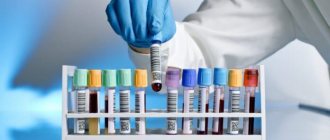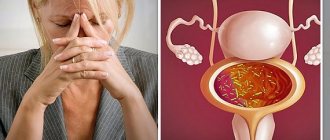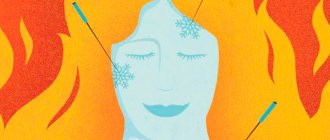Factors influencing the age at which menopause begins in women
- Diabetes mellitus, thyroid dysfunction, malignant neoplasms, other chronic diseases.
- Carrying out therapeutic measures: surgical interventions, radiation or chemotherapy.
- Abuse of alcohol, drugs, smoking.
- Prolonged psycho-emotional stress (stress, depression, constant anxiety).
- Heavy physical activity: work, sports training.
- Inadequate nutrition as a result of low social status.
- Irregular sexual intercourse, low frequency.
- Surgical interventions on the mammary glands, uterus, ovaries, hormonal imbalance.
Maintaining a healthy lifestyle, high frequency of sun exposure, and weight control can delay menopause and the age at which it occurs. Taking hormones for a long time before the onset of this stage can also push back the generally accepted time frame. Some women use them as therapy.
Treatment methods for severe menopause
After diagnosis, a gynecologist or gynecologist-endocrinologist will prescribe the patient therapeutic treatment that will quickly overcome the disease. It is important to note that ignoring the signs of pathological menopause leads a woman to the development of oncology , arterial hypertension, diabetes mellitus, atherosclerosis and other serious diseases.
Hormone therapy
Such therapy for pathological menopause is mandatory for every woman. The choice and dosage of hormonal medications is prescribed by a doctor. Typically, drugs that eliminate unpleasant symptoms include Angelique, Divina, Klimonorm, Klimen and others. They are prescribed in a patch, tablets or in the form of injections.
Depending on the patient’s condition, suppositories and gels may be prescribed to improve their health. These include Estriol and Ovestin. In this case, the patient should take into account the general recommendations for taking medications so as not to harm the body.
Menopause: at what age it occurs, main stages
Menopause refers to hormonal changes in a woman’s body, as a result of which she loses reproductive function. It has three main stages:
- Premenopause. This period begins after 40 years and lasts until the onset of the last menstruation. Experts note that the average duration of premenopause ranges from 15 months to 6 years. During this time, there is a decrease in the production of female hormones estrogen and progesterone. At the same time, the level of male hormones in the female body decreases gradually, and in certain periods hyperandrogenism may be observed. This stage is accompanied by an increase in FSH (follicle-stimulating hormone). It is this that is indicative when conducting tests, which indicates hormonal changes. Menstruation becomes irregular, the cycle constantly increases from 30 to 80 days. Their intensity is also unstable: sometimes the bleeding is intense, sometimes it is very scanty.
- Menopause at around 50-55 years of age. This stage occurs after the cessation of the last menstruation and lasts 12 months. During this period, FSH levels increase even more. Changes in hormonal levels can lead to the development of diabetes, obesity, and cardiovascular diseases. Many people have osteoporosis, which is why limb fractures often occur.
- Postmenopause. The period is characterized by the end of hormonal changes. It occurs 1 year after the last menstrual bleeding. The duration of the stage is 12-24 months. The ovaries stop producing hormones, estrogen levels decrease by 2 times. Against this background, FSH is quite high; it is determined in the laboratory by performing a blood or urine test.
FSH levels can be determined independently using a pharmacy test.
The age of menopause in women is an individual factor. His average is 48 years plus/min 3 years. There are deviations from these averages - early (before 40 years) and late menopause (after 55 years).
Pathological menopause: description of the condition and proper treatment of the disease
In the life of every woman, over time, the natural process of completing the menstrual cycle occurs, which is called menopause. It is divided into 2 types - normal and pathological menopause. Normally, menopause occurs at the age of 45-55 years, but sometimes its symptoms appear too early (at 40 years old) or, conversely, late (at 55 years old or more). In this case, we can talk about the course of a pathological menopause, which requires mandatory treatment.
General and specific symptoms: when to see a doctor?
Changes in a woman’s body are inevitable; they are a natural physiological process. To understand at what age menopause occurs, you need to consult a doctor. He will not be able to predict the beginning of the stage in advance, but some signs allow him to see premenopause and prepare the body physically and emotionally.
At the premenopausal stage, in 60% of cases there is a decrease in the intensity of menstrual bleeding and an increase in the cycle.
Symptoms of menopause can be divided into general, common in most cases, and specific.
Common symptoms of menopause
Common manifestations include:
- Hot flashes are a condition of sudden redness of the face, décolleté, and back of the head. It is accompanied by a feeling of heat, sweating, numbness, and a tingling sensation in the fingers. Rarely, a woman may lose consciousness. Such symptoms can occur at any time of the day, but most often occur in the evening. Its duration is 2-3 minutes, after which the woman feels a feeling of cold. This symptom does not affect the age at which menopause occurs in women.
- Vertigo – hormonal imbalance leads to abnormal blood pressure and a sharp change in its indicators.
- Excitability – disorders of the autonomic nervous system. Vivid manifestations are insomnia, changes in biorhythms (daytime sleepiness), unreasonable feelings of anxiety, and constant causeless irritability.
A woman feels hot flashes unexpectedly. The main signs are severe redness of the face, sweating, and a feeling of stuffiness. This goes away after a few minutes and the woman returns to normal.
Hot flashes last about 1-2 years, in rare cases their duration increases to 5 years.
Specific symptoms
Specific manifestations include disorders that may occur with some probability from the genitourinary, psycho-emotional, and nervous systems.
Characteristic manifestations of psycho-emotional deviations are:
- Hysteria is an unreasonable emotionally unstable state.
- Unreasonable conditions, manifested in the form of increased tearfulness, irritability, feelings of fear or anxiety, and disturbances in night sleep.
- The body's reaction to certain smells or sounds.
- Severe depression. They have a low response to treatment. May be accompanied by a change in the woman's behavior, which becomes aggressive or defiant. Some representatives, trying to subconsciously prolong their youth, begin to dress vulgarly and behave accordingly.
The state of the nervous system largely depends on the level of estrogen in the body. With hormonal imbalance, their number decreases. If there is a lack of microelements such as magnesium and calcium, a severe course of menopause is possible (no matter how old it would have come).
Violation of the heart rate leads to shallow breathing and an increase in its frequency. As a result, the woman constantly complains that she is suffocating, has difficulty breathing, and is constantly short of air. If such symptoms are present, it is difficult for a woman to stay indoors for a long time, in large crowds of people.
Also during this period, troubled night sleep, increased sleepiness during the day, and the appearance of snoring with prolonged pauses in breathing may occur. A sharp decrease in estrogen can lead to the development of severe, chronic diseases.
About 52% of women note that the onset of menopause is a stressful situation for them.
Possible deviations from the genitourinary system and musculoskeletal system include:
- Atrophic vaginitis. An insufficient amount of female hormones significantly changes the processes occurring in the uterus and vagina. The result is dryness caused by lack of lubrication, discomfort and burning, lack of blood supply, and drooping of the walls.
- Atrophic cystourethritis. Against the background of a frequent urge to urinate, a woman feels a burning sensation, discomfort, and painful conditions.
- Uterine prolapse. This occurs due to the fact that atrophy processes affect the pelvic muscles. As a result, the bladder and urethra become displaced.
- The skin becomes flabby, and there is a tendency for age spots to appear. Hair loss on the head and intensive growth on the face are also characteristic.
- Osteoporosis during the postmenopausal period. Lack of estradiol leads to a stop in bone tissue renewal. As a result, a woman’s height decreases, a stoop appears, sometimes developing into severe forms of spinal curvature. Increased fragility of bones causes fractures to occur even with little force. The greatest discomfort is caused by painful sensations in the joints and spine, and rapid fatigue.
- Decreased sexual desire. Dry mucous membranes and a depressed emotional state lead to a lack of desire.
Severe menopause is rare; when the first signs of menopause appear, a woman should consult a doctor. The gynecologist will evaluate the abnormalities that have arisen and the general condition of the patient. In some cases, hormonal or homeopathic medications may be prescribed to relieve discomfort.
Why does pathological menopause occur?
With the development of pathological menopause, a decrease in the production of sex hormones occurs. This is the main reason for the development of the disease. Estrogen reduction occurs when the ovaries run out of follicles.
Since the cause of the development of pathological processes is considered to be a decrease in hormonal levels, female representatives tolerate the onset of menopause in their own way. This mainly depends on:
- health conditions;
- nutrition;
- lifestyle;
- the presence of other diseases of the body that occur in acute form;
- the difference between the amount of sex hormones (the stronger it is, the worse the patient will tolerate pathological menopause);
- time of year - in the spring, menopause is more difficult, since in winter people are “attacked” by a lack of vitamins and ultraviolet deficiency.
Unpleasant symptoms of menopause that have occurred in a pathological form should be a compelling reason to visit a doctor. After all, hormonal imbalances greatly aggravate the condition and also prevent the body from functioning normally. If you do not take therapeutic measures, the process of pathological menopause will be longer, which will negatively affect your health.
Pathologies of the genital organs, which aggravate the onset of menopause, are also considered to be the cause of menopause in a dangerous form. In this case, their treatment is carried out first, and only then the pathological menopause is treated.
Hormonal disorders during menopause: when does imbalance occur?
Due to the fact that the age of onset of menopause and the severity of its course is an individual issue, there is no clear indication at what period it is worth consulting a doctor. A woman should know that if there is a hormonal imbalance during certain periods (perimenopause), the level of male hormones can be very high. In this case, hyperestragenia occurs. It is characterized by the following symptoms:
- The thickness of the uterine walls increases, their structure becomes more dense.
- Enlargement of the mammary glands. New growths appear in them - compactions, which upon palpation cause pain.
- Increased amount of cervical secretion. There is more mucus, the vaginal walls become looser, and additional folds appear on them.
- The appearance of fibroids and other neoplasms.
- Menstrual bleeding becomes abnormally intense and its frequency increases. Additionally, functional bleeding not associated with menstruation may occur.
Hyperandrogenism leads to an increase in body weight of 5-8 kg with a disproportionate increase in abdominal size.
To talk about hyperestragenia, several symptoms must appear simultaneously. It is not allowed to make diagnoses on your own or start taking any medications. Only a doctor is able to correctly assess the patient’s condition and alleviate it.
Early menopause in women: at what age does it occur, causes
Early menopause refers to the appearance of symptoms and characteristic conditions at the age of a woman 35-40 years old. This is a compelling argument to get tested. The reasons for this behavior of the body are genetic and acquired factors.
The average age of menopause in women in Russia is 48±3 years. Early menopause leads to irreversible reactions in the body. A woman not only loses her reproductive function, she begins to age quickly.
Hereditary causes include genetic predisposition (such a course was observed in other representatives of the genus in the female line), a defect in the X chromosome, some syndromes, and genetic diseases.
Early menopause occurs in only 1% of women.
Acquired factors are circumstances that arise as a result of external influence. This includes other hormonal dysfunctions (diabetes mellitus, thyroid diseases), gynecological abnormalities of various etiologies, drug therapy with certain types of drugs, a significant violation of the normal body index, up or down. The onset of early menopause can be triggered by taking hormonal contraceptives in violation of the protocol or by independently selecting the drug.
Early menopause is characterized by the onset of changes in the body, accelerated aging processes - a woman looks older than her years. The appearance of cancer at this age (up to 40 years) against the background of hormonal imbalance is especially dangerous.
As a result of menopausal changes, a woman's ovaries completely stop functioning. In postmenopause, their weight is only 4 g, which is 2 times less than that of women with preserved reproductive function. This leads to the fact that it is almost impossible to get pregnant and carry a child to term. You can get a free consultation or make an appointment with a specialized specialist here https://45plus.rf/registration/.
In order to timely determine menopause and its stages, a woman should regularly attend preventive examinations and independently test for FSH content. This makes it possible to respond as quickly as possible to subsequent changes in the body. A psychological attitude is also important, which will allow you to endure all possible difficulties of your emotional and physical state much easier.
Pathogenesis
For many, the menopause is associated with the autumn of life, withering and the road leading to old age. Translated from Greek, “climax” means ladder or “step.” This is truly a very difficult period in a woman’s life. Many perceive the menopause as a personal catastrophe, the collapse of women's happiness and a feeling of irrevocability of the years lived. But there are women who calmly, without undue drama, perceive the coming changes, look confidently into the future and try to use the current situation for self-improvement and self-realization. Ladies who perceive menopause tragically endure it more difficult. Negativity spills out in excessive irritability, hysterics, depressed mood and depression. Those ladies who are calm about the new stage of life have fewer health problems.
It is impossible to say with certainty when a woman will experience menopause and how it will proceed. But every lady “over forty” needs to prepare for the fact that she can expect rather unpleasant signs, and sometimes symptoms of severe menopause: “hot flashes”, causeless irritability, insomnia, headaches, pressure surges. They are caused by hormonal changes: the gradual decline of the ovaries, age-related changes in the centers of the hypothalamus.
What medications make it possible to go through menopause before your due date?
Today, various medications can be used for artificial menopause, both in the form of injection solutions and in the form of sprays and tablets. These drugs can be purchased without a prescription, but their independent use is strictly prohibited. Most often, gynecologists prescribe the following drugs for artificial menopause:
- Diferelin - start using the 3rd day of the menstrual cycle. Course duration is up to 6 months.
- Goserelin is used subcutaneously, the course is no more than 6 months.
- Buserelin - nasal spray, course 2 times a day for no longer than 6 months.
- Zoladex - Injections used from 1 to 5 days of the menstrual cycle.
- Duphaston - tablets for artificial menopause containing homologues of gestogens.
Read
Nutrition during menopause and menopause: diet and healthy foods
How long artificial menopause lasts should be decided by a doctor. Typically therapy lasts 6 months, but everything is individual.











